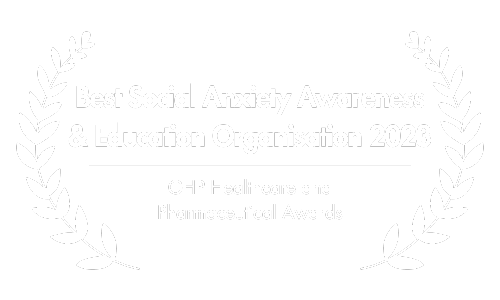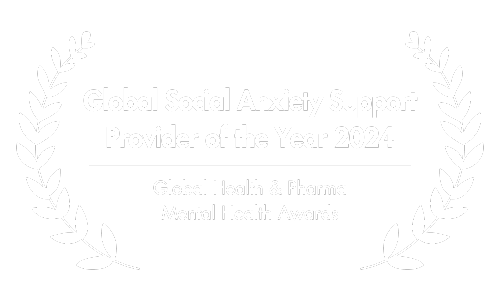Social Anxiety & Romantic Relationships: Practical Advice for Couples
Social anxiety disorder (SAD) is incredibly common, accounting for one of the most common mental health conditions in the world (Kessler et al., 2005).
Even people who do not qualify for a diagnosis often struggle with social anxiety (Porter, Chambless, & Keefe, 2017), which can affect a range of different life domains.
One of the main problem areas of socially anxious people is the establishment and maintenance of romantic relationships.

Not only do socially anxious people often find it difficult to enter into an intimate relationship, but many continue to have interpersonal problems even after such a relationship has been established (Davidson, Hughes, George, & Blazer, 1994).
Here, we look at common problems that people with social anxiety and their partners face in their relationships, and offer some helpful tips for affected couples.
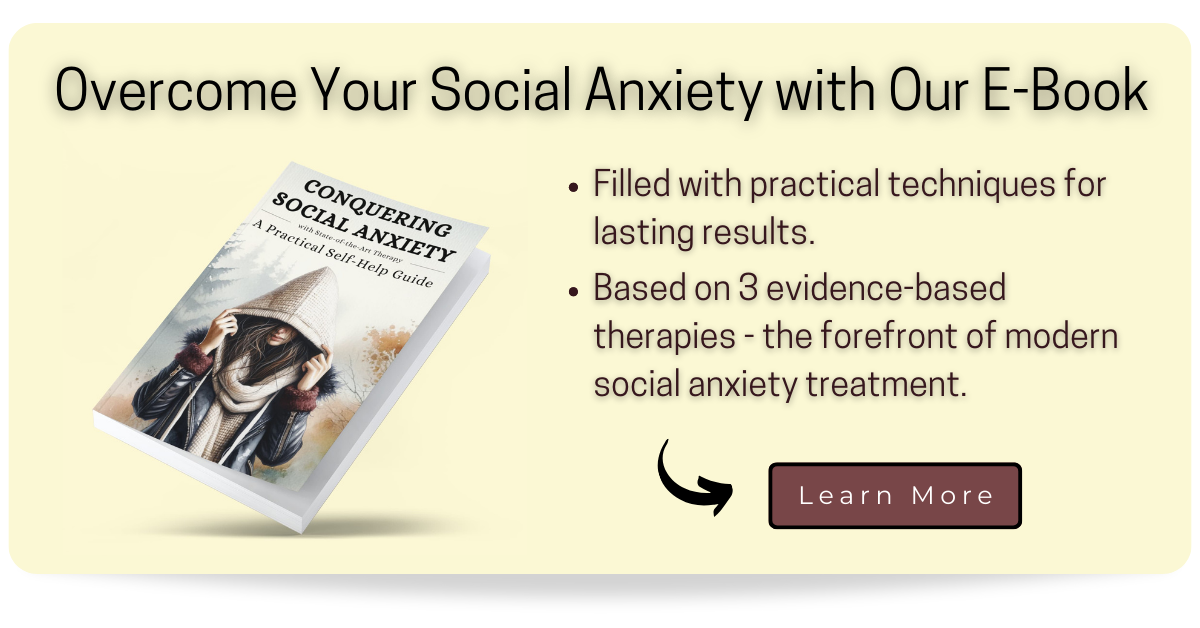
Social Anxiety & Romantic Relationships: Typical Problems
Social anxiety strongly affects interpersonal functioning, such as in the form of decreased assertiveness, increased sensitivity to criticism, or failure to communicate effectively.
Because of that, it only makes sense that romantic relationships are often negatively affected by it.
To begin, let’s take a look at the most common problems people with social phobia face in their intimate relationships.

Research has found that socially anxious people tend to experience the following difficulties:
- a decreased likelihood of developing romantic relationships (Alden & Taylor, 2004; Hudson & Rapee, 2008);
- increased difficulties with intimacy, self-revelation and emotional expression (Porter & Chambless, 2014; Sparrevohn & Rapee, 2009; Harvey & Wenzel, 2002);
- increased communication difficulties (Wenzel, Graff-Dolezal, Macho, & Brendle, 2005);
- increased dependence on their partner, often identifiable through submissiveness, clinging behaviors, and an excessive reliance on their partner for support and reassurance (Davila & Beck, 2002);
- less social support from their partner (Rapee, Peters, Carpenter, & Gatson, 2015);
- a lower likelihood of getting married (Wittchen, Fuetsch, Sonntag, Muller, & Liebowitz, 2000);
- and higher rates of romantic breakups (Porter & Chambless, 2017).

As you can see, there are a number of interpersonal problem areas that often take their toll on relationships and lead to lower relationship satisfaction for people with SAD (Porter & Chambless, 2014).
Let’s examine why these problems occur and what can be done about them.
Emotional Openness vs. Emotional Inhibition
As we detail in our complete guide to social phobia (you can access this comprehensive article by clicking here), social anxiety is characterized by the worry of being negatively evaluated, judged, or rejected (American Psychiatric Association, 2013).
These evaluative concerns are typically accompanied by uncomfortable thoughts, feelings and sensations (Kashdan, Volkmann, Breen, & Han, 2007).
For example, a socially anxious person may begin to worry about being negatively evaluated by their partner (“He’s going to think I’m boring“), and experience increased anxiety that is accompanied by an accelerated heartbeat and increased sweating.
Since these phenomena can be very unpleasant and can be the cause of interpersonal friction or embarrassment, people with social phobia often try to avoid contact with these experiences (Clark & Wells, 1995).

The primary goal of most socially anxious people is to avoid rejection at all costs, while retaining some degree of connectedness with others (Kashdan, Volkmann, Breen, & Han, 2007).
Therefore, openly revealing their negative and uncomfortable feelings to others may pose a threat to them.
For example, expressing anger, dissatisfaction, fear, or insecurity may cause others to perceive them as unattractive, weak, or vulnerable, which may negatively impact their relationship.
For this reason, people with SAD often restrict the information they share with others, as this minimizes the possibility of being humiliated or rejected.
The Drawbacks of Emotional Openness
For individuals who score low on measures of social anxiety, open expression of emotion generally results in substantial social benefits and is therefore considered a healthy regulation strategy (Keltner & Kring, 1998; Kennedy-Moore & Watson, 2001).
In moderate doses, emotional expression helps most couples improve the intimacy of their relationship, and the retention of negative emotions has been linked to relationship deterioration.
For people with social anxiety, on the contrary, this is often not the case.
As they usually experience chronic negative thoughts, pervasive fears, anticipatory anxiety or ruminative thoughts, their partners may react negatively if they are continually confronted with these concerns (Wenzel, Graff-Dolezal, Macho, & Brendle, 2005).
After all, it can be burdensome for people to routinely obtain detailed information about the psychological difficulties of their socially anxious romantic partner.

The continuous negative content of the verbal and nonverbal expressions of people with SAD, as well as their tendency to avoid feared social situations, can then easily end up taking their toll on their romantic partners (Alden & Taylor, 2004).
Over time, the partner may become increasingly uncomfortable with the relationship and reduce the social support they provide to their socially anxious spouse.
As a result, both partners may feel increasingly detached, less cared for, and less fulfilled in their relationship (Gottman & Levenson, 1992, 1999).
Socially anxious individuals with marked feelings of dependence on their partner are often especially prone to refrain from sharing their true emotions, thoughts, and feelings.
Given their strong dependency on their partner, they may fear that revealing these inner experiences will jeopardize their relationship and lead to them being abandoned.
Thus, unlike relationships between people with low social anxiety, those involving at least one partner with high social anxiety appear to benefit to some extent from a decrease in emotional expression on the part of the socially anxious person.
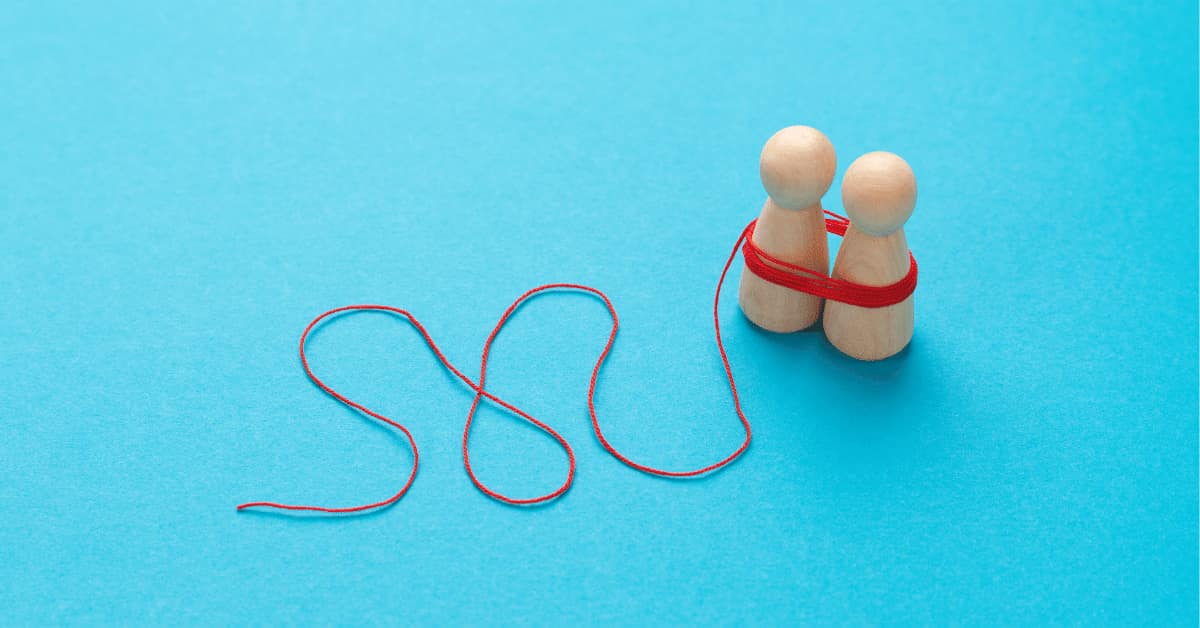
In addition, research has shown that socially anxious individuals, especially women, who share their negative emotions with their partner tend to develop the view that their relationship is not as they wish (Kashdan, Volkmann, Breen, & Han, 2007).
One of the main reasons for this seems to be the lack of social support from their partner in times of emotional difficulty.
When socially anxious individuals realize that their wishes for intimacy are repeatedly not met by their partners, they often begin to feel less connected to them and pay more attention to their unfulfilled desires.
This means that there is a fundamental difference between people with social anxiety (especially women) and people with low social anxiety.
While for most people the expression of negative emotions leads to increased relationship satisfaction, the opposite is true for those with high levels of social fears.

The Need to Belong as a Priority
When faced with strong negative emotions (such as anxiety in social situations), many people with social phobia engage in extreme social withdrawal (Ishiyama, 1984).
Others, in turn, may become hostile and openly express anger and discontent (Ayduk, Downey, Testa, Yen, & Shoda, 1999; Twenge, Baumeister, Tice, & Stucke, 2001).
As both these reactions can alienate romantic partners, people with SAD often inhibit their negative emotions in social situations that they experience as stressful.
By suppressing their emotions, they can often successfully avoid these automatic, reflexive responses (Hirsch & Clark, 2004).

This way, socially anxious individuals can strategically reduce the chances of being rejected by their romantic partner (Kashdan, Volkmann, Breen, & Han, 2007).
Especially once a romantic relationship has been formed, women with social anxiety tend to have a very strong incentive to preserve it (Gilbert, 2001; Leary, 2000).
In comparison to men, women are generally more motivated to reduce their emotional expression in order to keep their partners both satisfied and committed to them (Timmers, Fischer, & Manstead, 1998).
Maintaining their romantic relationship, regardless of the cost, may provide them with some sense of security and even perceived social connectedness, even if they do not share their true feelings with their partner.
This strategy tends to ensure the stability of the relationship and feelings of closeness to their partner, while providing important psychological benefits, namely the satisfaction of their need to belong (Aron et al., 2004).
The Drawbacks of Inhibiting Negative Emotions
So far, we have discussed the potential benefits of suppressing negative emotions and inhibiting the automatic reactions when social anxiety is triggered.
However, this behavioral strategy has significant drawbacks. Namely, this approach often leads to an increase in the exact emotions one is trying to avoid (Gross, 1998).
As you try to suppress anxiety, anger or sadness, they are likely to grow more intense over time.
Other important disadvantages are sacrifices of authenticity as well as the loss of the ability to communicate the need for social support and affiliation (Keltner & Haidt, 1999; Keltner & Kring, 1998).
If you do not communicate your difficulties to your partner, there is no reason for them to provide emotional support.
This also makes it more difficult for your partner to pick up on and understand what kinds of situations and behaviors you appreciate and which ones you do not.

As mentioned earlier, socially anxious people try to avoid rejection and social exclusion at all costs.
This means that people with social phobia willingly sacrifice being assertive, expressive, authentic and even happy in an attempt to satisfy their need to belong (Gilbert, 2001; Leary, 2000).
In other words, they clearly prioritize the maintenance of their romantic relationship, while falling short in meeting other psychological needs, such as autonomy, personal growth and a sense of self-efficacy.
As you can see, trying to maintain their relationship often comes at the expense of their personal well-being, which is problematic.
Nevertheless, people with social anxiety, especially women, are often prepared to accept these costs as long as they can preserve their romantic relationship (Kashdan, Volkmann, Breen, & Han, 2007).
Failure to Communicate Effectively
People are generally motivated to reduce discrepancies between current reality and desired reality in order to achieve a more satisfying level of functioning (Higgins, 1987).
In line with this idea, most people who find themselves in a relationship that they don’t consider positive try to improve it or decide to break up with their partner.
It has been hypothesized that socially anxious people, particularly women, are more passive when they realize that their romantic relationship is not the one they desire (Kashdan, Volkmann, Breen, & Han, 2007).
This may be due to their lesser assertiveness, their tendency to avoid conflict and their dependency on their romantic partner.
This often leads to a lack of use of restorative strategies or active attempts to end their romantic relationship, relinquishing control of the relationship to their partner.

Adopting a passive or passive-aggressive stance, when a more proactive approach would be more appropriate, can lead to deterioration of the relationship.
It also means that relationship problems, which could be resolved through open discussion, are maintained or even amplified over time, which is likely to lead to a romantic breakup.
Failure to communicate effectively is a major problem in romantic relationships, and is often seen in people who suffer from social anxiety.
The aforementioned lack of assertiveness, the tendency to avoid open conflict and the desire to maintain the relationship no matter what, are the main reasons for this behavior.
Now that we have covered the theoretical basis of relationship problems caused by social anxiety, let’s look at what can be done to reduce or even prevent them.

Practical Takeaways for Affected Couples
As can be seen from the previous points, couples affected by social anxiety can benefit greatly if they gain awareness of their problem and consciously decide to adjust their behavior to make their relationship more satisfying.

This applies not only to the person affected by social anxiety, but also to their non-anxious partner. Therefore, we will discuss tips and recommendations for both parties.
Keep in mind that every couple is different and that the following recommendations should be taken with a grain of salt.
If you struggle with serious relationship issues, you may consider initiating couples therapy with a qualified mental health professional. More on that later.
Tips for Your Relationship if You Have Social Anxiety
If you are affected by social anxiety and believe it is negatively influencing your relationship, the following recommendations may help you.
Find a Balance of Emotional Openness
Determine how much of your emotional experiences you openly share with your partner.
If you bottle up and hide most of your negative emotions, you could try to be more open with your partner about your inner experiences.
If you constantly share how anxious, worried, embarrassed, or angry you feel, or continually communicate the details of your anxious thoughts and the effects anxiety has on your body, consider cutting back a bit.
You can overwhelm your partner with too much of it.

Individual therapy or local support groups are great places to delve deeper into your experiences with social anxiety and share your emotions in detail.
If you are the type of person who tends to overwhelm your partner with your negative emotions, consider exploring these spaces to work through them.
Reduce Social Withdrawal in Moments That Matter Most to Your Partner
Social avoidance is a basic part of social anxiety. Therefore, it is understandable that you have a strong urge to withdraw socially when you are afraid of certain social situations or feel hurt or embarrassed.
Be aware, however, that this can take its toll on your partner. Even the most understanding spouse will be affected by their partner’s frequent social avoidance.
For this reason, consider making an effort when it comes to events and activities that really matter to your partner.

For example, your partner may want you to accompany them on a trip with their parents, take you to meet their best friends, or join them for a special occasion at work.
They go out of their way to support you, try to support them too. They will appreciate your effort.
Look for Additional Sources of Social Inclusion
If you rely heavily on your partner to satisfy your need to belong, this is likely to lead to unhealthy behavior patterns on your part.
For example, you may be overly submissive, clinging to your partner and seeking constant reassurance that he or she is still in love with you and that the relationship is not in jeopardy (Davila & Beck, 2002).
This behavior can be burdensome or unattractive to your partner, especially in the long run.

To reduce this, you can look for ways to be less reliant on your relationship to satisfy your need to belong.
There are many options for doing so. For example, you can strengthen ties with your family, make new friends or reconnect with old ones, or even join a local support group for people with social anxiety, among many others.
If your partner is not the only one who provides you with a sense of belonging, social inclusion and support, you are likely to relate to them in a healthier and more sustainable way.
Learn to Communicate More Effectively
One of the main difficulties for people with social anxiety is the ability to speak openly about uncomfortable topics.
This is especially true when dealing with feelings of anger and discontent related to an important person, such as their romantic partners.
The underlying fear is that their partner will reject them when they share their concerns. As we have noted, people with social anxiety usually try to avoid rejection at all costs.
However, bottling up your negative feelings about your partner and your relationship often comes at a great cost, as suppressing anger is believed to further fuel feelings of social anxiety (Sulz, 2013).

Therefore, it may be crucial for you to improve your communication skills to discuss the aspects of your relationship that you would like to change or improve.
As so often in life, here too communication is king.
Start a Therapeutic Process
If your social anxiety is intense and causes substantial difficulties in your life, such as a deterioration in your romantic relationship, it may be time to work with a qualified mental health professional, such as a psychotherapist.
Also, as we have noted above, many socially anxious people sacrifice important psychological needs to satisfy their need to belong.
Psychological attributes such as increased assertiveness, authenticity, self-efficacy and autonomy, among others, can be difficult to cultivate on your own.
A therapeutic process can help you strengthen these qualities, which in turn will lead to a healthier way of relating to others, such as to your partner.
Tips for Your Relationship if Your Partner Has Social Anxiety
If your partner struggles with social anxiety, there are a number of things you, as their significant other, can do to improve your relationship.
Let Your Partner Know That You Care
Having a partner with social anxiety can be hard at times.
They may have a greater tendency to avoid feared social situations, to overshare their negative thoughts and emotions related to their social fears, or to refrain from sharing any intimate information at all.
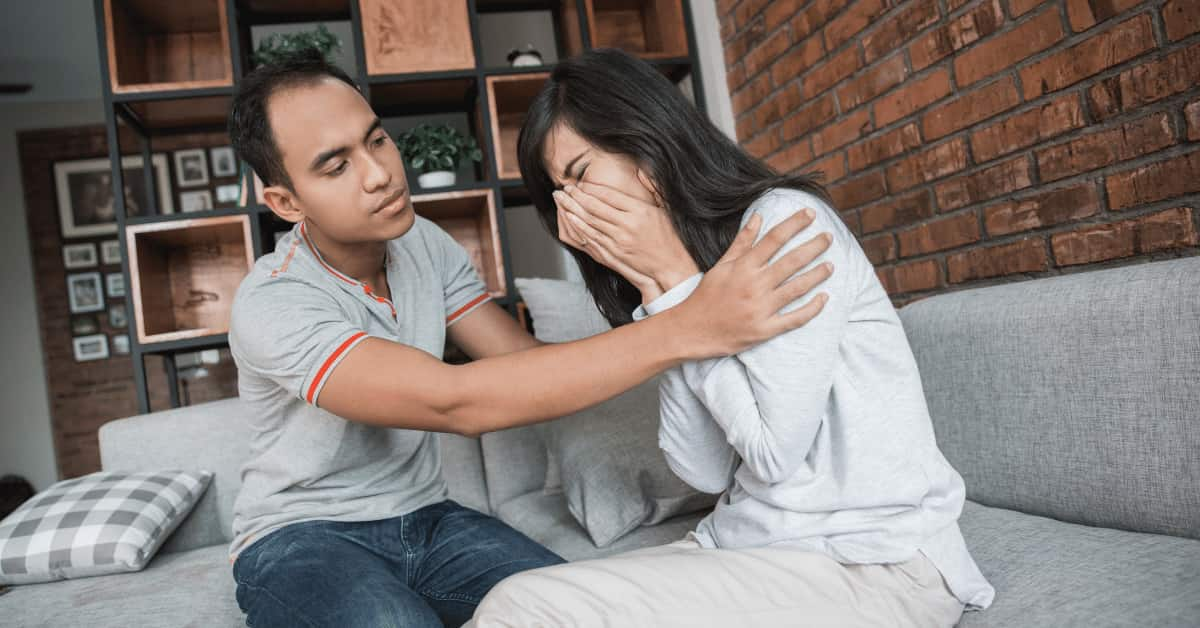
This is often accompanied by increased sensitivity to criticism, clinging behaviors, marked submissiveness and a lack of autonomy.
You, as their partner, may become frustrated and perceive these behaviors as a burden, which can easily lead to outbursts of frustration and arguments.
While your frustration may be understandable, keep in mind that your partner is not consciously choosing to be this way.
In fact, they are suffering because of their social anxiety and would surely change it if it were that simple.
Let your partner know that you are on their side, that you support them and that you are willing to find a way to improve your relationship together.
When discussing your relationship with your partner, it can be helpful to start by letting them know that you care deeply about them and your relationship.
This will reassure them that you are not rejecting them despite your concerns and complaints.

Communicate What You Need From Your Partner
Depending on your partner and how they handle their social fears, they may overwhelm you with their emotions and negative thoughts, or do the exact opposite and not share any emotional experiences at all.
If these tendencies are affecting you and your relationship in a negative way, you may want to address this with your partner.

It is important that they understand that their behavior has a major impact on your well-being and your relationship.
Think about what you need from your partner to feel better about the relationship and to feel closer to her or him.
If you are supportive of your partner, you have the right to expect the same from them.
However, be patient with them, as behavioral change does not happen overnight.
Do Not Accept Total Submissiveness From Your Partner
As mentioned earlier, many socially anxious people tend to be very dependent in their romantic relationships.
As a result, they often assume a submissive position in an attempt to keep their partner happy and content.
They often fear that sharing their honest opinion or being more assertive may harm their relationship.
This typically happens even with simple things, such as not having a preference for a movie on date night or where to go on your next vacation.

In reality, your partner may have important preferences, opinions, or even wants and needs, but may simply not communicate them to you for fear that you will end up feeling less satisfied with your relationship.
This, of course, is a false and exaggerated belief, given that you are a rational and mature person.
Don’t take your partner’s submissiveness at face value. Sometimes, you just have to ask twice to get an honest answer.
Other times, it can also be helpful to let your partner know that you would rather listen to their honest opinion than for them to try to make you happy.
Even if it’s a nice gesture on their part, you want them to be happy too, right?
Encourage Your Partner To Break Their Habit of Social Withdrawal
As you surely know by now, social anxiety is marked by high levels of social avoidance.
Your partner may tend to avoid situations that he or she fears, such as family gatherings, parties or other social events, such as get-togethers with friends.
As we highlight in our complete introductory guide to social phobia (you can click here to be taken to this article), avoidance of feared social situations may provide short-term relief, but tends to maintain and often increase social anxiety in the long term.
Therefore, therapy for social anxiety addresses avoidance behavior by encouraging repeated exposure to feared social situations (you can click here to access our full treatment guide, which covers effective psychotherapies as well as medication for social phobia).

While you, as their romantic partner, want to be understanding and supportive of your spouse’s situation, you can also play an important role in breaking their habit of social withdrawal.
For example, you, as their significant other, may be able to convince them to accompany you to meet with friends or participate in another social activity that you would like to attend.
Especially when these activities are important to you, your partner may be more willing to make the effort and join you.
After all, they are your partner and you deserve to have them act out of character for you from time to time.
In doing so, they also perform a therapeutic activity for themselves, since giving up avoidance of social interactions is an important achievement for people who want to reduce their social anxiety.
Be Aware of Your Partner’s Marked Need to Belong
As we have already mentioned, people with social anxiety have a marked need to belong.
Of course, we all have this need. However, socially anxious people clearly prioritize it above anything else.
The reasons for this are manifold, and while it is useful to understand them, they are beyond the scope of this article.
For you, as the romantic partner of a person with social anxiety, it is very important to understand the role this need plays for your spouse.
The fewer close and meaningful social relationships your partner has, the more important you and your romantic relationship are to them.
While it may be great to be an important part of your partner’s life, if you are the sole source of feelings of social acceptance, inclusion and belonging, this can easily become problematic.

Specifically, because this intensifies your partner’s fear of losing you as their significant other.
This leads them to be even more prone to unhealthy relational behaviors (such as clinging and extreme submissiveness) and to sacrifice other psychological needs along the way (authenticity, autonomy, self-efficacy, among others).
For this reason, it can be crucial for your partner to establish and cultivate additional connections that provide some sense of social inclusion and acceptance, such as friendships or being part of a group that shares a hobby and meets regularly.
While this is your partner’s responsibility, it is important that you understand the importance of these additional connections.
This way, you can reassure your partner that you approve of him or her spending time with others and perhaps even encourage them to seek out these spaces.
Couples Therapy: A Valid Option
This article is intended as a first resource for couples affected by social anxiety.
We hope that it clarifies the initial doubts that are common to both parties, the person with social anxiety and their partner.
While the above recommendations can effectively help in many cases, they have important limitations, as romantic relationships are very complex and often require a deep understanding of the unique dynamics of a given couple.
If your relationship is negatively influenced by your or your partner’s social anxiety, couples therapy may be a great option.

This way, a mental health professional specialized in relationship dynamics and interpersonal conflict resolution will work with both of you to find possible causes and solutions to improve your relationship.
Depending on your country and city of residence, you may be able to find a good therapist to see you in person.
If you prefer online treatment, we recommend online-therapy.com, where you will be put in contact with a qualified therapist to work on your relationship problems together with your partner, from the comfort of your own home.
If this article was of help to you and you decide to sign up at online-therapy.com, you can give back to us by using the following link to see the pricing and get started: Sign Up for Online Couples Therapy.
Not only will you support our website and allow us to keep creating resources like this one -because we may earn a commission for this referral at no additional cost to you -, but you will also receive a 20% discount for your first month of therapy.
In addition, this article focuses exclusively on the effects of social anxiety on romantic relationships. If you are interested in other domains of life that are often affected by social anxiety, we recommend that you click here to read our article on the ten most serious consequences of living with social anxiety disorder.

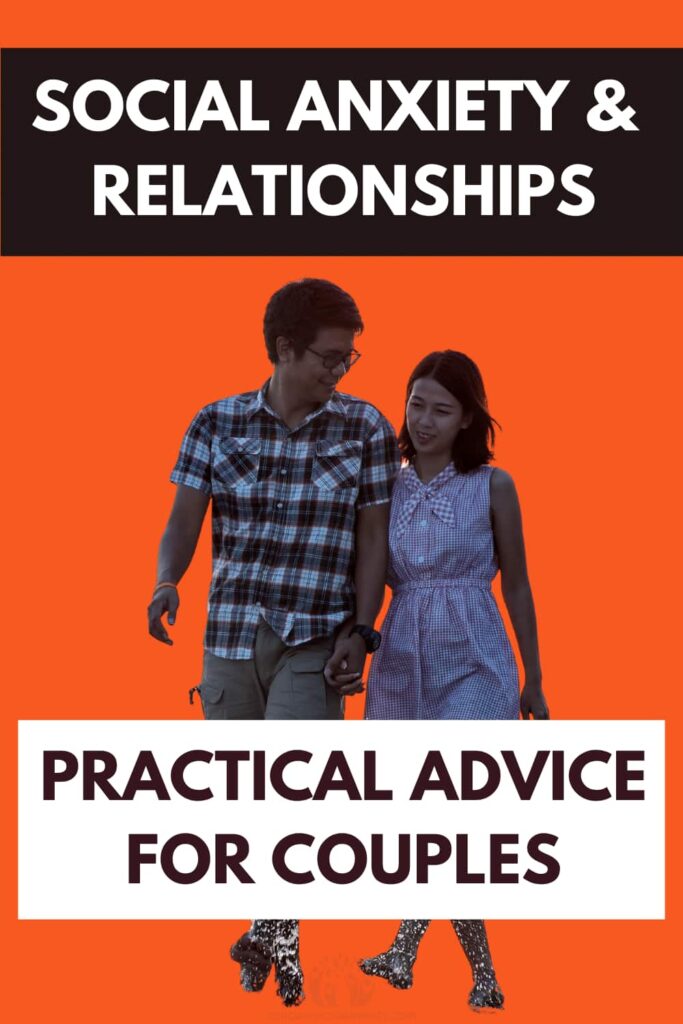
Pin | Share | Follow
[DISPLAY_ULTIMATE_SOCIAL_ICONS]
Alden, L. E., & Taylor, C. T. (2004). Interpersonal processes in social phobia. Clinical psychology review, 24(7), 857–882. https://doi.org/10.1016/j.cpr.2004.07.006
Aron, A., McLaughlin-Volpe, T., Mashek, D., Lewandowski, G., Wright, S. C., & Aron, E. N. (2004). Including others in the self. European Review of Social Psychology, 15, 101–132. https://doi.org/10.1080/10463280440000008
Ayduk, O., Downey, G., Testa, A., Yen, Y., & Shoda, Y. (1999). Does rejection elicit hostility in rejection sensitive women? Social Cognition, 17(2), 245–271. https://doi.org/10.1521/soco.1999.17.2.245
American Psychiatric Association. (2013). Diagnostic and statistical manual of mental disorders (5th ed.). Arlington, VA: American Psychiatric Publishing.
Clark, D. M., & Wells, A. (1995). A cognitive model of social phobia. In R. G. Heimberg, M. R. Liebowitz, D. A. Hope, & F. R. Schneier (Eds.), Social phobia: Diagnosis, assessment, and treatment (pp. 69–93). The Guilford Press.
Davidson, J. R., Hughes, D. C., George, L. K., & Blazer, D. G. (1994). The boundary of social phobia. Exploring the threshold. Archives of general psychiatry, 51(12), 975–983. https://doi.org/10.1001/archpsyc.1994.03950120047008
Davila, J., & Beck, J. G. (2002). Is social anxiety associated with impairment in close relationships? A preliminary investigation. Behavior Therapy, 33(3), 427–446. https://doi.org/10.1016/S0005-7894(02)80037-5
Gilbert P. (2001). Evolution and social anxiety. The role of attraction, social competition, and social hierarchies. The Psychiatric clinics of North America, 24(4), 723–751. https://doi.org/10.1016/s0193-953x(05)70260-4
Gottman, J. M., & Levenson, R. W. (1992). Marital processes predictive of later dissolution: behavior, physiology, and health. Journal of personality and social psychology, 63(2), 221–233. https://doi.org/10.1037//0022-3514.63.2.221
Gottman, J. M., & Levenson, R. W. (1999). What predicts change in marital interaction over time? A study of alternative models. Family process, 38(2), 143–158. https://doi.org/10.1111/j.1545-5300.1999.00143.x
Gross, J. J. (1998). The emerging field of emotion regulation: An integrative review. Review of General Psychology, 2(3), 271–299. https://doi.org/10.1037/1089-2680.2.3.271
Harvey, J.H., & Wenzel, A. (2001). Characteristics of Close Relationships in Individuals With Social Phobia: A Preliminary Comparison With Nonanxious Individuals.
Higgins, E. T. (1987). Self-discrepancy: A theory relating self and affect. Psychological Review, 94(3), 319–340. https://doi.org/10.1037/0033-295X.94.3.319
Hirsch, C. R., & Clark, D. M. (2004). Information-processing bias in social phobia. Clinical psychology review, 24(7), 799–825. https://doi.org/10.1016/j.cpr.2004.07.005
Hudson, J. L., & Rapee, R. M. (2009). Familial and social environments in the etiology and maintenance of anxiety disorders. In M. M. Antony & M. B. Stein (Eds.), Oxford handbook of anxiety and related disorders (pp. 173–189). Oxford University Press.
Ishiyama, F. I. (1984). Shyness: Anxious social sensitivity and self-isolating tendency. Adolescence, 19(76), 903–911.
Kashdan, T. B., Volkmann, J. R., Breen, W. E., & Han, S. (2007). Social anxiety and romantic relationships: the costs and benefits of negative emotion expression are context-dependent. Journal of anxiety disorders, 21(4), 475–492. https://doi.org/10.1016/j.janxdis.2006.08.007
Keltner, D., & Haidt, J. (1999). Social Functions of Emotions at Four Levels of Analysis. Cognition & Emotion, 13(5), 505–521. doi:10.1080/026999399379168
Keltner, D., & Kring, A. M. (1998). Emotion, social function, and psychopathology. Review of General Psychology, 2(3), 320–342. https://doi.org/10.1037/1089-2680.2.3.320
Kennedy-Moore, E., & Watson, J. C. (2001). How and When Does Emotional Expression Help? Review of General Psychology, 5(3), 187–212. https://doi.org/10.1037/1089-2680.5.3.187
Kessler, R. C., Berglund, P., Demler, O., Jin, R., Merikangas, K. R., & Walters, E. E. (2005). ” Lifetime prevalence and age-of-onset distributions of DSM-IV disorders in the National Comorbidity Survey replication”: Erratum.
Leary, M. R. (2000). Social anxiety as an early warning system: A refinement and extension of the self-presentational theory of social anxiety. In: S. G. Hofman, & P. M. DiBartolo (Eds.), Social phobia and social anxiety: An integration (pp. 321–334). New York: Allyn & Bacon.
Porter, E., & Chambless, D. L. (2014). Shying away from a good thing: social anxiety in romantic relationships. Journal of clinical psychology, 70(6), 546–561. https://doi.org/10.1002/jclp.22048
Porter, E., & Chambless, D. L. (2017). Social Anxiety and Social Support in Romantic Relationships. Behavior therapy, 48(3), 335–348. https://doi.org/10.1016/j.beth.2016.12.002
Porter, E., Chambless, D. L., & Keefe, J. R. (2017). Criticism in the Romantic Relationships of Individuals With Social Anxiety. Behavior therapy, 48(4), 517–532. https://doi.org/10.1016/j.beth.2016.11.002
Rapee, R. M., Peters, L., Carpenter, L., & Gaston, J. E. (2015). The Yin and Yang of support from significant others: Influence of general social support and partner support of avoidance in the context of treatment for social anxiety disorder. Behaviour Research and Therapy, 69, 40–47. https://doi.org/10.1016/j.brat.2015.03.012
Sparrevohn, R. M., & Rapee, R. M. (2009). Self-disclosure, emotional expression and intimacy within romantic relationships of people with social phobia. Behaviour research and therapy, 47(12), 1074–1078. https://doi.org/10.1016/j.brat.2009.07.016
Sulz, S. K. D. (2013). Wo Angst ist, soll Wut werden – oder: Wut ist unsere vitale Kraft. Deutsche Angst Zeitschrift, (61).
Timmers, M., Fischer, A. H., & Manstead, A. S. R. (1998). Gender differences in motives for regulating emotions. Personality and Social Psychology Bulletin, 24(9), 974–985. https://doi.org/10.1177/0146167298249005
Twenge, J. M., Baumeister, R. F., Tice, D. M., & Stucke, T. S. (2001). If you can’t join them, beat them: Effects of social exclusion on aggressive behavior. Journal of Personality and Social Psychology, 81(6), 1058–1069. https://doi.org/10.1037/0022-3514.81.6.1058
Wenzel, A., Graff-Dolezal, J., Macho, M., & Brendle, J. R. (2005). Communication and social skills in socially anxious and nonanxious individuals in the context of romantic relationships. Behaviour Research and Therapy, 43(4), 505–519. https://doi.org/10.1016/j.brat.2004.03.010
Wittchen, H. U., Fuetsch, M., Sonntag, H., Müller, N., & Liebowitz, M. (2000). Disability and quality of life in pure and comorbid social phobia. Findings from a controlled study. European psychiatry : the journal of the Association of European Psychiatrists, 15(1), 46–58. https://doi.org/10.1016/s0924-9338(00)00211-x

About the Author: Martin Stork
Martin is a professional psychologist with a background in physical therapy. He has organized and led various support groups for people with social anxiety in Washington, DC and Buenos Aires, Argentina. He is the founder of Conquer Social Anxiety Ltd, where he operates as a writer, therapist and director. You can click here to find out more about Martin.







